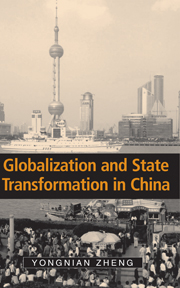Book contents
- Frontmatter
- Contents
- List of figures
- List of tables
- List of abbreviations
- Preface
- 1 Globalization: State decline or state rebuilding?
- 2 The state, leadership and globalization
- 3 Globalism, nationalism and selective importation
- 4 Power, interests, and the justification of capitalism: Constructing an interest-based political order
- 5 Bureaucratic reform and market accommodation
- 6 Building a modern economic state: Taxation, finance and enterprise system
- 7 State rebuilding, popular protest and collective action
- 8 Contending visions of the Chinese state: New Liberalism vs. the New Left
- 9 Globalization and towards a rule-based state governance?
- Notes
- Bibliography
- Index
- CAMBRIDGE ASIA-PACIFIC STUDIES
Preface
Published online by Cambridge University Press: 11 December 2009
- Frontmatter
- Contents
- List of figures
- List of tables
- List of abbreviations
- Preface
- 1 Globalization: State decline or state rebuilding?
- 2 The state, leadership and globalization
- 3 Globalism, nationalism and selective importation
- 4 Power, interests, and the justification of capitalism: Constructing an interest-based political order
- 5 Bureaucratic reform and market accommodation
- 6 Building a modern economic state: Taxation, finance and enterprise system
- 7 State rebuilding, popular protest and collective action
- 8 Contending visions of the Chinese state: New Liberalism vs. the New Left
- 9 Globalization and towards a rule-based state governance?
- Notes
- Bibliography
- Index
- CAMBRIDGE ASIA-PACIFIC STUDIES
Summary
Globalization in the past few decades has swept every corner of the world. While many countries have benefited from unprecedented global flow of capital, human talent, scientific knowledge and other resources that a country's modernization requires, globalization has also brought about enormous unexpected consequences. In the early 1990s, scholars were optimistic that globalization would herald the onset of a global democratic movement that would bring about greater representation and prosperity to the global community. But the 1997 financial crisis and the political instability that ensued corrected this sanguine view. The world had barely recovered from the consequences caused by rapid and massive capital flows when it was confronted with another scourge – global terrorism. The 9–11 attacks in the United States was the harbinger of terrorist acts in other parts of the world such as Southeast Asia. In essence, globalization has not brought about unmitigated benefits but has a reverse side as well. With globalization, as with physics, every action or new development has its own reaction or consequences.
This study examines the impact of globalization on the Chinese state in the Asian context. For many years, Asian countries have become the foci for scholarly exploration. Major events such as the 1997 Asian financial crisis, Indonesia's turbulent transition to democracy, China's entry into the World Trade Organization (WTO), and the spread of terrorism in many Asian countries, have prompted me to reflect on globalization and its impact on the nation-state in Asian societies.
- Type
- Chapter
- Information
- Globalization and State Transformation in China , pp. xv - xviiiPublisher: Cambridge University PressPrint publication year: 2003
- 1
- Cited by

